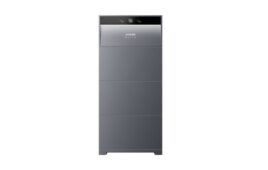After announcing a 4.5-GWh deal for zinc-alkaline energy storage systems from Urban Electric Power, Pine Gate Renewables has also signed on for 2,400 MWh of metal-hydrogen batteries from EnerVenue.
 Pine Gate Renewables will deploy EnerVenue battery systems to support its growing pipeline of projects over the next four years. EnerVenue’s differentiated battery technology has continued to drive rapid company growth since its founding in 2020. EnerVenue raised $125 million in Series A funding, now has 140 employees, and continues to accelerate hiring of engineering talent.
Pine Gate Renewables will deploy EnerVenue battery systems to support its growing pipeline of projects over the next four years. EnerVenue’s differentiated battery technology has continued to drive rapid company growth since its founding in 2020. EnerVenue raised $125 million in Series A funding, now has 140 employees, and continues to accelerate hiring of engineering talent.
“EnerVenue batteries offer a differentiated value proposition – lower degradation across a wide temperature band, and lower cost for maintenance and augmentation, whilst posing no fire or thermal runaway risk. These batteries also have a stackable form factor and can last for more than 30-years while being able to cycle multiple times a day,” said Raafe Khan, Director of Energy Storage at Pine Gate Renewables.
EnerVenue’s batteries use nickel-hydrogen technology that has been tested for decades on the International Space Station and Hubble Space Telescope. The company formed in 2020 to bring the NASA-originated technology to grid-scale and other stationary power applications.
“Pine Gate Renewables excels at launching and operating renewable energy and energy storage projects, and is an ideal partner for deploying EnerVenue’s innovative battery systems,” said Randy Selesky, Chief Revenue Officer, EnerVenue. “We’re proud to work with Pine Gate in expanding renewable energy usage to new locations, businesses, and partners across the country, and we are excited for what the next four years will bring for both of our organizations.”





It’s always something. A residential robust ESS made with this technology could be 75kWh and the nickel-hydrogen battery would take up about 44 cubic feet of space. About 8 feet by 12 feet by 2 feet of Nema 4 cabinet space mostly for battery cells but also some solar PV appurtenances like solar PV chargers and smart grid interactive inverter/charger modules. These guys are starting out at utility scale projects of something like 25MWh to 300MWh and finally it seems a goal of 2GWh. The hope is one day (very soon) these guys will catch on and offer their 7.5kWh modules to the public at $150/kWh or perhaps less than $100/kWh in a couple of years. The utilities should be afraid (very afraid).